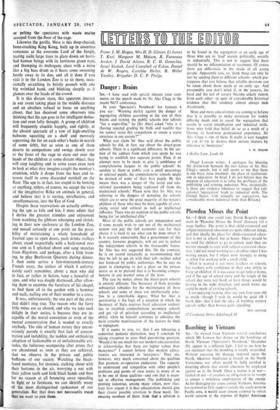Danger : Brains
E'MUCI'N1
an
From: J. M. Hogan, Mrs H. D. Glover, Lt James T. Keel, Margaret M. Mahon, R. Furneaux Jordan, I. David Adams, R. C. H. Genochio, Israel Shahak, Lord Campbell of Eskan, Daniel de W. Rogers, Caroline Heller, R. Miller Yardley, Brigadier D. C. P. Phelps.
Sett,—I have read with special interest your com- ments on the speech made by Sir Alec Clegg to the recent NUT conference.
In your 'Spectator's Notebook' for January 6 you say: 'Warning darkly against the danger of segregating children according to the size of their brains and turning the public schools into schools "for a super-Elite," he [Sir Alec] asked "why is it (having rejected grading by birth and wealth) that we cannot resist this compulsion to create a status structure in our society?"' What you claim Sir Alec said about the public schools he did, in fact. say about the direct-grant schools. There is a significant difference. In the sec- tion of his address from which you quote he was trying to establish two separate points. First, if an attempt were to be made to give 'a semblance of comprehensive lacquer to the public schools' by sending to them at public cost a small percentage of selected pupils, the comprehensive schools might be drained of some of their best pupils. By this means there was a danger of 'the social and edu- cational pacemakers being syphoned off from the maintained schools.' Please note that Sir Alec was referring to the dangers of denuding the schools which are to serve the great majority of the nation's children of those who may be most capable of exer- cising social and cultural as well as intellectual influence. There was no mention of the public schools being for 'an intellectual Elite.'
Most of the public schools are independent and if some people wish to opt out of the maintained system and pay the full economic rate for their choice it is hard to see what can be done about it. It is scarcely conceivable that a government of this country, however pragmatic, will set out to outlaw the independent schools in the foreseeable future. Sir Alec has not suggested this. On the contrary, he is on record repeatedly as recommending that they be left to get on with their job—neither aided nor hindered by public authorities. But he sees no point in attempting to put a gloss on the private sector so as to pretend that it is becoming compre- hensive in any normal sense of the term.
The case he makes about the direct-grant schools is entirely different. The Secretary of State provides substantial subsidies for the maintenance of these schools and some of these are intellectually selec- tive to a remarkable degree. What Sir Alec is questioning is the logic of a situation in which the Secretary of State requires local education authori- ties to establish comprehensive secondary schools and get rid of selection according to intellectual ability while he himself continues to subsidise the most extreme manifestation of the feature he finds so repugnant.
If it seems to you, sir, that I am labouring a somewhat pedantic distinction, may I conclude by taking exception to your final patronising question, 'Would it be too much for our modern educationalists to acknowledge that there are higher values than mateyness?' I cannot believe that modem educa- tionists are interested in `mateyness.' They are, however, very much concerned about the qualities that promote co-operative endeavour. The capacity to understand and sympathise with other people's problems and points of view seems to many of us to be one of those qualities—and one that is essen- tial to effective management. The publishing and printing industries, among many others, now illus- trate how urgent it is that educationists should give their closest possible attention to these needs. De- creasing numbers of them think that a solution is
to be found in the segregation at an early age of those who are to 'lead' society politically, socially or industrially. This is not to suggest that there should be no differentiation of treatment. Of course there are differences in the needs of all young people. Apparently you, sir, think these can only be met by sending them to different schools—which pre- supposes that you believe that reliable decisions can be taken about those needs at an early age. And presumably you don't mind if, in the process, the head and the tail of society become utterly remote from each other—in spite of considerable historical evidence that this tendency almost always ends disastrously.
More and more educationists are coming to believe that it is possible to make provision for widely differing needs and to avoid the segregation that results in social stratification and industrial strife. Some who hold that belief do so as a result of a lifetime of hard-won professional experience. Sir Alec Clegg is one of these. It really is very naughty of you to try to dismiss these serious matters by reference to 'mateyness.'
J. M. HOGAN 1 Hollin Lane, Leeds 16
[Nigel Lawson writes: I apologise for blurring the distinction between the two halves of Sir Alec Clegg's speech, but it still seems to me that there is one basic issue involved: the place of egalitarian- ism in education. In brief, I do not believe that the purpose of education is to solve the problems of the publishing and printing industries. Nor, incidentally, Is there any evidence whatever to suggest that edu- cational 'segregation' leads to industrial strife. The United States, with virtually no segregation, has considerably more industrial strife than Britain.]


































 Previous page
Previous page